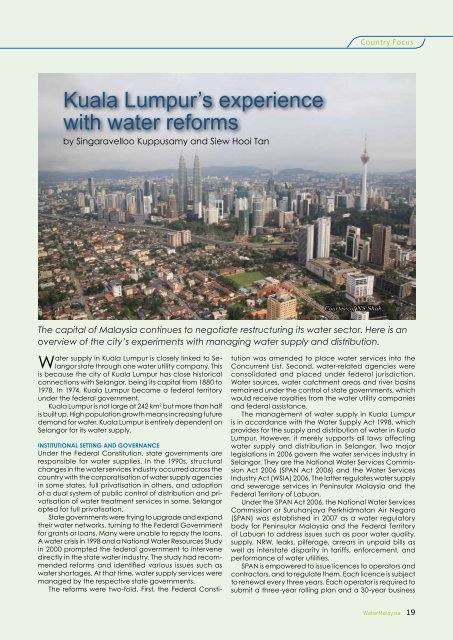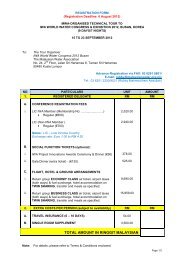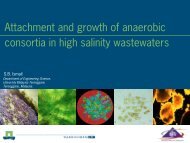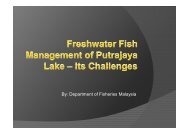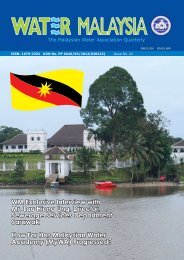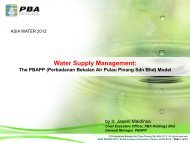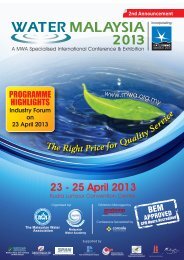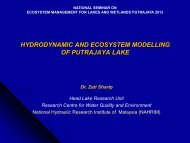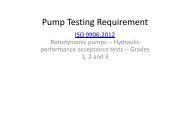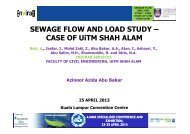Returning Malaysia's Rivers To L - Malaysian Water Association.
Returning Malaysia's Rivers To L - Malaysian Water Association.
Returning Malaysia's Rivers To L - Malaysian Water Association.
Create successful ePaper yourself
Turn your PDF publications into a flip-book with our unique Google optimized e-Paper software.
Country Focus<br />
Kuala Lumpur’s experience<br />
with water reforms<br />
by Singaravelloo Kuppusamy and Siew Hooi Tan<br />
Courtesy of NS Shah<br />
The capital of Malaysia continues to negotiate restructuring its water sector. Here is an<br />
overview of the city’s experiments with managing water supply and distribution.<br />
<strong>Water</strong> supply in Kuala Lumpur is closely linked to Selangor<br />
state through one water utility company. This<br />
is because the city of Kuala Lumpur has close historical<br />
connections with Selangor, being its capital from 1880 to<br />
1978. In 1974, Kuala Lumpur became a federal territory<br />
under the federal government.<br />
Kuala Lumpur is not large at 242 km 2 but more than half<br />
is built up. High population growth means increasing future<br />
demand for water. Kuala Lumpur is entirely dependent on<br />
Selangor for its water supply.<br />
Institutional Setting and Governance<br />
Under the Federal Constitution, state governments are<br />
responsible for water supplies. In the 1990s, structural<br />
changes in the water services industry occurred across the<br />
country with the corporatisation of water supply agencies<br />
in some states, full privatisation in others, and adoption<br />
of a dual system of public control of distribution and privatisation<br />
of water treatment services in some. Selangor<br />
opted for full privatisation.<br />
State governments were trying to upgrade and expand<br />
their water networks, turning to the Federal Government<br />
for grants or loans. Many were unable to repay the loans.<br />
A water crisis in 1998 and a National <strong>Water</strong> Resources Study<br />
in 2000 prompted the federal government to intervene<br />
directly in the state water industry. The study had recommended<br />
reforms and identified various issues such as<br />
water shortages. At that time, water supply services were<br />
managed by the respective state governments.<br />
The reforms were two-fold. First, the Federal Constitution<br />
was amended to place water services into the<br />
Concurrent List. Second, water-related agencies were<br />
consolidated and placed under federal jurisdiction.<br />
<strong>Water</strong> sources, water catchment areas and river basins<br />
remained under the control of state governments, which<br />
would receive royalties from the water utility companies<br />
and federal assistance.<br />
The management of water supply in Kuala Lumpur<br />
is in accordance with the <strong>Water</strong> Supply Act 1998, which<br />
provides for the supply and distribution of water in Kuala<br />
Lumpur. However, it merely supports all laws affecting<br />
water supply and distribution in Selangor. Two major<br />
legislations in 2006 govern the water services industry in<br />
Selangor. They are the National <strong>Water</strong> Services Commission<br />
Act 2006 (SPAN Act 2006) and the <strong>Water</strong> Services<br />
Industry Act (WSIA) 2006. The latter regulates water supply<br />
and sewerage services in Peninsular Malaysia and the<br />
Federal Territory of Labuan.<br />
Under the SPAN Act 2006, the National <strong>Water</strong> Services<br />
Commission or Suruhanjaya Perkhidmatan Air Negara<br />
(SPAN) was established in 2007 as a water regulatory<br />
body for Peninsular Malaysia and the Federal Territory<br />
of Labuan to address issues such as poor water quality,<br />
supply, NRW, leaks, pilferage, arrears in unpaid bills as<br />
well as interstate disparity in tariffs, enforcement, and<br />
performance of water utilities.<br />
SPAN is empowered to issue licences to operators and<br />
contractors, and to regulate them. Each licence is subject<br />
to renewal every three years. Each operator is required to<br />
submit a three-year rolling plan and a 30-year business<br />
<strong>Water</strong>Malaysia 19


